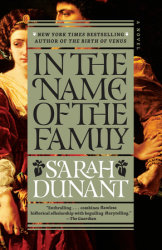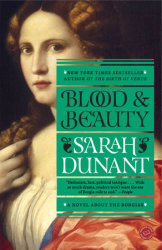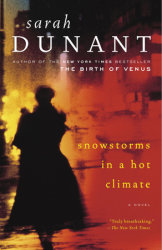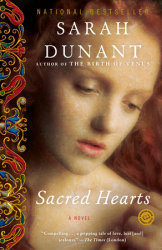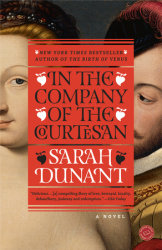PENGUIN RANDOM HOUSE: It seems like, as a culture, we have a slight obsession with families of power. Where do you think that fascination comes from? What in particular fascinated you about the Borgias?
SARAH DUNANT: I have spent the last fifteen years studying this amazing period known as the Italian renaissance. And alongside great art I have come to understand a lot about the power of family in that time. It’s no coincidence that the mafia and the Godfather come out of Italy. This is a country that until 160 years ago wasn’t a country at all, but a set of city-states, jockeying for power, and almost all of them at one time or another were run by dynasties. So family was a form of government. Even in the church in Rome you find that it’s families that control the main appointments. And given the corruption of this time that meant literally family: cardinals or even Popes not only had nephews, nieces, etc but also children of their own (illegitimacy was acceptable within family power structures) appointed. In such a world loyalty and trust was paramount. And family was the tightest unit you can have.
When it comes to the Borgia family, the high drama comes firstly from the fact that when Rodrigo becomes Pope he has four children of marriageable age which he can – and does – use openly as political pawns, both inside and outside the church. Secondly, they are Spanish and not Italian, so they have to fight the existing family power structures to make their mark. The comparison with the Mafia is rich here. Like the new family muscling in on another territory, they need to be smart, fearless, and up for turf warfare. That is the real story of Blood & Beauty: renaissance Mafia.
PRH: The whole Borgia family, from its Papal patriarch to vengeful offspring, is known for its ability to charm. As a woman, Lucrezia had to rely on different sorts of wiles and charms in order to make her way through her family’s legacy. Do you think she held her own in the game? Did her power, in its own way, rival that of her ambitious father and brothers?
SD: Like the whole family, Lucrezia has suffered from history. The Borgias lost their struggle for power when the Pope died. Their sworn enemies took power and, as we all know, since the victors write the history, the Borgias come out of it very badly. And since the easiest slanders are always against women, Lucrezia suffers most of all; reviled as a whore, a murderess, a willing participant in incest and a poisoner.
So to write Blood & Beauty the first thing I had to do was to scrape off all this encrusted scandal. When I did what I found was a quieter, more intelligent, sensitive and eventually powerful young woman, who begins at twelve years old married off as a family pawn and through seven years and three husbands has to learn “on the job” how to hold her own in the political bear pit into which she has been thrown. And little by little she does. By the age of eighteen such is her natural abilities that her father is giving her jobs as a governor of towns he holds and when he goes away on business she even takes over the running of the Vatican office: a scandal of course in one way, but those who work with her find her efficient and charming.
She finally comes into her own in her third marriage, after her father’s death, when the family ambitions are in ruins, but she manages to forge a working relationship with a husband who, while they do not “love” each other, become partners in the ruling of a state. So this is the real Lucrezia: a woman who, like her father and brother, had a natural appetite and intelligence for politics, which when combined with charm and femininity but also a streak of steel, allowed her to be a survivor and the founder of her own dynasty.
PRH: In a way, the story of the Borgia family is one of the ultimate outsider success; They were a Spanish family that became successful in Rome. There’s something wildly inspiring about that. Can you talk a little about how their success in a foreign court is unusual and unprecedented in history?
SD: In terms of the history of the Catholic Church, no other foreign family came close to making the impact that the Borgias did. Alexander was a natural, brilliant strategist with a huge appetite for life, politics, and women. Cesare had the intelligence, speed, and ambition to be a highly competent, sometimes necessarily ruthless general and a leader of men. Together and as a family they came close to forging a new dynastic state in the middle of Italy, and even Machiavelli – the most astute diplomat and historian of his age – has nothing but admiration for Cesare at this moment, as is clear when he uses him as an example in his masterpiece “The Prince.”
But what makes them so “wildly inspiring” is that everything in their lives is a high-wire balancing act. They are working against the clock of how long the pope (sixty-one when he takes the papal throne) will live. That is what makes Blood & Beauty as much a thriller as a historical novel. And with every step they take, each triumph and each mistake, the vultures and the jackals are waiting to move in for the kill.
PRH: You hint at plans for a sequel; how far do you plan on taking us into the Borgia history?
SD: I never planned to write two books. But the deeper I got into this amazing history, this race against the clock, the more I realized that to really understand this extraordinary family and their impact on Italian history, you had to understand the brutality, corruption, and complexity of the world they lived in. And that meant a longer book.
How much more is there to tell? Well, the next eighteen months of their history is high-octane drama: war, love, treachery, sacrifice, illness, and death. It is about the dizzying rise of Cesare and his equally dizzying fall and Lucrezia’s fight to keep her place in a family and state where once again she is the reviled foreigner.
How much of it will I tell? Oh, goodness. Ask me again when the book is finished.







